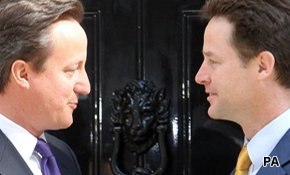As Britain’s fledgling coalition marks its 11th day in effect, the British electorate have been watching, closely, the performance of the Conservative leader David Cameron and his former rival - come partner, Nick Clegg.
Nearly half of British adults (48%) think that David Cameron, the youngest politician to occupy the position of Prime Minister in almost 200 years, has been doing a good job in his first few days in office. One ‘tygger’, on TellYouGov, noted that Cameron ‘deserves credit for his first week at the helm’ while another noted that Cameron was ‘more reasonable’ than he expected. Nick Clegg’s approval rating among the British electorate was similar, with 46% saying they thought he was doing a good job as Deputy Prime Minister, with one ‘tygger’ suggesting he should keep up with the good work.
At first glance, one would be forgiven for thinking it a relatively poor indictment to have only 40%, or so, happy with how your new coalition was running. However, when we delve further into the figures, we see that things aren’t too bad for the pair, as only 12% think Cameron is doing a bad job, while Clegg is slightly higher at 14%. The rest (40%) claimed for both leaders, that they didn’t know how well they were doing in office; perhaps a reaction to the fact that the coalition is so young, thereby leaving little with which one could make an informed decision - at this point at least - on the issue of performance.
It generally goes without saying that ‘trust’ is an integral part of any successful partnership, be it a marriage, a business venture or a team sport. The same is also true for coalition governments. The public, however, have made clear their reservations on the issue of trust in the coalition government. When asked whether the Liberal Democrats should trust David Cameron, a significant 33% of the public thought it was a mistake for the Lib Dems to trust him. When asked however, the same about Clegg, only 16% thought it a mistake for him to be trusted by the Conservatives. This may explain why a 45% majority feel that the Conservatives and Liberal Democrats have little in common and will soon be fighting among themselves.









